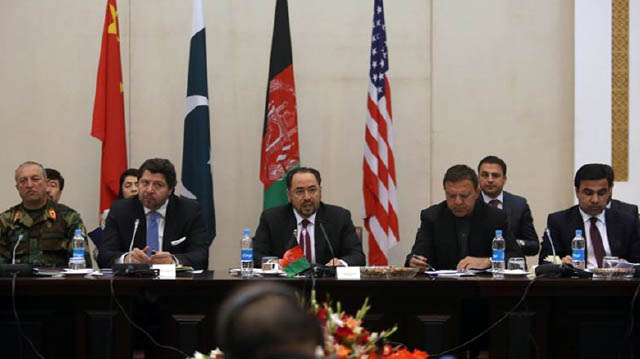The surge in militancy and terrorist attacks have led to great casualties and created a sense of fear and disappointment in the air. Violence and bloodshed continue unabated, mainly with the emergence of the self-styled Islamic State of Iraq and the Levant (ISIL) and with the splinter groups. Reportedly, fighting and attacks in populated areas and major cities were described as the main causes of civilian deaths in 2015, underscoring a push by Taliban militants into urban centers “with a high likelihood of causing civilian harm”. Including Taliban-claimed attacks, the United Nations Assistance Mission in Afghanistan assigned responsibility for 62 per cent of total civilian casualties in 2015 to anti-government elements. While ground engagements were the largest cause of civilian casualties, improvised explosive devices came second, a report said, adding that the use of such weaponry was in violation of international law and could constitute war crimes. Taliban fighters have made heavy inroads in recent months in spite of the peace talk discourse. The resumption of peace talk has reverberated for a long time and it is said that Kabul will host the four-nation meeting regarding peace negotiation today 23 February. Officials from Afghanistan, Pakistan, the United States and China will review progress in efforts for bringing the Afghan insurgents to the negotiating table.
In the last meeting of the Quadrilateral Coordination Group (QCG), which was held in Islamabad on February 6, the participants urged for direct negotiations between Kabul and Taliban elements by the end of this month. Issuing a joint statement, the four-nation group said that a roadmap to peace had been agreed upon and emphasized on ceasefire and an end in violence and bloodshed. Since, the four-nation group seeks resuming peace talk, the Taliban outfits have to declare truce and avoid spilling the blood of innocent civilians. Afghan officials have been struggling to reach an amicable agreement with the Taliban, however, it was proved abortive and they showed no clear stance in this regard. As a result, a number of Taliban prisoners were released during the Hamid Karzai’s administration as a peace offering, but it did not give the desired result either.
However, a member of Afghan High Peace Council (HPC) said, few days earlier, that the Taliban had shown willingness to participate in direct talks with the Afghan government. “After the efforts made by the HPC to bring the Taliban to the table of negotiations and also contact with the group members, they have shown willingness to talk peace with the Afghan government. The HPC is optimistic over the quadrilateral meetings on the peace talks and we hope that the sessions set the schedule for face-to-face talks between the Afghan government and the Taliban” he is cited as saying.
Similarly, political pundits believe that China and U.S. can play a significant role in the resumption of peace talk. Therefore, Kabul should get the two countries to urge Pakistan in order to sincerely support the peace process in Afghanistan.
During a meeting with Chinese ambassador in Kabul, Afghan President Muhammad Ashraf Ghani said that China was playing a vital role regarding security situation in Afghanistan. The Chinese envoy extended his country’s president best wishes to Ghani and to Afghan people at their meeting. He further said that China’s leadership concept about Afghanistan had taken a positive turn after Chinese Vice President Li Yuanchao’s visit to Kabul in November.
Talking at a gathering held in an Afghan air force base in Kabul, President Ghani said, “The message of the peace is clear, we want peace, but we want peace with dignity, we want peace talks that must stand on the basis of our constitution and that we want peace that must guarantee the rights of our people.” The first ever direct talks between the representatives of the Afghan government and the Taliban were held in Pakistan in late June, but it was stalled following the confirmation of Mullah Omar’s death. “All Afghans want the peace to return to their country but members of opponents who decline to take part in political negotiations would only marginalize themselves, and they will only serve the enemies of the country,” Ghani said.
On the other hand, Russia has called the peace talk “useless” and denied to participate in the talk. “We are not going to participate in these useless attempts and have already told the US about it. We do not see any practical sense in it. Russia does not want to be just a statistician, while Washington pursues its pre-elections targets,” the representative of the Russian Ministry of Foreign Affairs is quoted as saying. But the diplomat also said that Russia is ready to promote its own peace plan, whose main goal is primarily to create a roadmap for restarting peace negotiations between the Taliban and the Afghan National Government (NUG).
In the fourth round meeting in Kabul, it is believed that the four-nation group will further urge the Taliban insurgents to cease violence and bloodshed and hold a face-to-face talk with the Afghan government. But they are supposed to wait for the Taliban’s statements in this regard and whether they resume negotiation at the end of this month. Perhaps, it would be Pakistan’s turn to nudge Mullah Akhtar Mansour’s party to sit around the negotiating table. Since militancy continues without cessation, Taliban do not show enough tendencies and the fruition of peace talk is under doubt.
Home » Opinion » Kabul Hosts Fourth Meeting of QCG
Kabul Hosts Fourth Meeting of QCG
| Hujjatullah Zia

